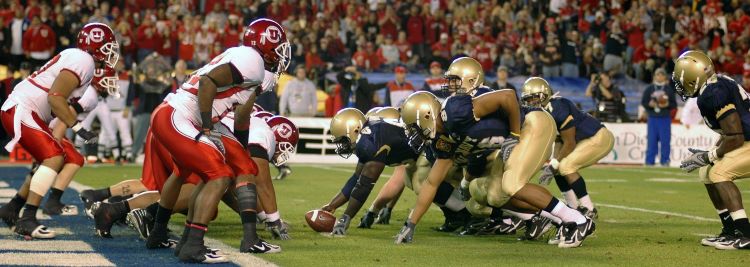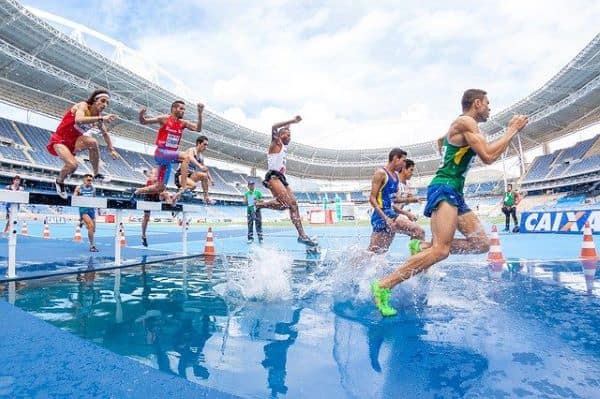Please note: As an Amazon Associate I earn from qualifying purchases. I also work with other affiliate partners and may be compensated from the links below. Details here.
Copyright and the Law: Can You Sell Sports Photos Legally? (Guide)

Welcome to my guide on selling sports images online (legally)!
In the world of sports photography, there are many different things to consider. You have to know what you are doing in order to capture the best shots possible.
After all the hard work, it would totally be great to make money out of these shots. However, the legality of selling those images could be questionable. What are your rights to sell pictures taken at an event?
In general, you can take photographs of the public without their permission. But when it comes to selling these images or using them commercially you need to get permission – from the subject, or even the event organizers of that sports activity.
So, in this post, you will learn about:
- your legal rights as a (sports) photographer
- copyright issues you need to be aware of
- how you can legally sell your sports photos
- what are the factors to consider in general
Disclaimer: Legality is a grey area with anything and I’m NOT a lawyer. In here, I’ll share what I’ve learned but I strongly encourage you also consult a professional before making decisions.
Now with this disclaimer out of the way, let’s begin!
Legal Rights of (Sports) Photographers
Generally speaking, you have the right to take pictures of anything and everything, as long as it’s in a public space. But, what are really the rights you have as a sports photographer?
I’ve listed the most important rules you need to know as an artist:
-
Capturing photos in public
As long as you are on public land, you have every right to take an image of basically everything – people, buildings, trees, streets, etc. The moment you snap the shutter, you automatically earn the copyright over these shots.
It doesn’t matter if you are taking a picture of a celebrity who happens to be in the area, or an athlete cooling down after a game. You are free to take their pictures. But selling them? Well, that’s another story.
The main point here is that whenever you are on a public territory, you can exercise this right as a photographer (as long as it doesn’t trample on other people’s rights as well).
Well…
This may be okay for most countries, but there are other regions that do not allow you to freely take photos of people and buildings in public.
Take for example North Korea. We all know how strict they are when it comes to the media. There are only certain areas in the country where you are allowed to take images. And if you happen to sneak your camera into restricted areas, just get ready for a stringent punishment when caught.
Another example would be Saudi Arabia. There, taking pictures without permission from the subject is considered a crime, much so if the people appearing in them are women.
This law is also imposed on taking shots of security facilities and other infrastructures that can potentially put the entire country’s safety at risk.
So before snapping that image, you should always consider the cultural and legal restrictions of the place you are in. Always stay on the safe side!
-
Taking pictures of private events (with permission)
If taking pics in public is generally acceptable, is it the same in private spaces? Certainly not!
You cannot directly take photos during exclusive gatherings held in a non-public venue unless you were hired by the organizer to cover the occasion.
Not all games are held on a public field. Sometimes, there are sports activities organized by private institutions. If you happen to gain access to them, it doesn’t mean you have the absolute right to snap your camera every time you feel like it.
You will only have the right to take pictures under the following circumstances – you were hired by the host, or you had express permission to do so.
Some organizers tap professional photographers to do the job, however, it is not so bad to ask them and check whether you still have a spot in the team.
If not, then you can politely ask for permission that you want to cover the event free of charge and discuss with them your intention in doing so. If they allow you, then that’s a feat!
But if they don’t, you better not push it. You don’t want to end up getting kicked out of the venue, do you?
-
Publishing your work
Remember when I said you own the copyright of your photos? With that said, you also have the right to publish your work.
However, this right isn’t absolute. There are still some restrictions that you need to consider before posting your images elsewhere.
A great example would be cropping a shot you took of a building, showing what the people inside are doing. You might face some issues with this because the structure itself is considered private and the people in it expect to have their privacy respected.
Others may be totally okay with them being seen in the frame, but others wouldn’t like this. So, as much as you can, only publish those that do not invade other people’s privacy or those that do not pose security dangers to establishments.
-
Selling your shots
This is where the real struggle starts. Selling your work may not be as easy as you think.
You have to consider a lot of things before making money out of the images you took. Will selling them not put your reputation at risk? Will you not face legal consequences for it? Are you not going to receive backlash from the subject once they see their faces on whichever site you sold the photos to?
Actually, whether you can sell your images or not depends on your purpose for doing so. If you want to put your pictures on a stock website, there shouldn’t be any problem with this.
But, if you plan to sell the pictures to advertisers or companies sponsoring a product used by the subject, then you can get sued for it. The person in the photo, or the company owning the logos seen on them, might not like this idea.
Would you like it if you saw your face on a billboard without your permission? I bet you wouldn’t.
Grounds for Copyright Breach in Photography

Before I go on discussing the various grounds for violation of property rights, let’s first talk about copyright – what is it really?
Basically, it means owning a certain property (in this case, your photographs). Being the owner of the said work, you are entitled to reproduce, publish, post, or sell your art to others.
But the real question is, until when will you enjoy your copyright? Is this privilege absolute? Let’s find out below!
-
Work-for-hire
I know I’ve mentioned earlier that you earn the copyright from the moment you release that shutter button. However, you have to remember that there are limitations to this right.
When you are hired or paid to cover a sports event, technically speaking, the copyright belongs to the person who hired you for the job. A very good example would be when you are employed as a photographer for an advertising company. Your company will have the right over your images since they paid you for that job.
Now, you will be held liable if you sell these images as your own despite them falling into the category of work-for-hire. Not only you will face legal charges, but you might lose your job over it.
-
Invasion of privacy
This has been a long-standing topic of discussion in the photography industry, regardless of genre. On which basis can a person claim that his private life has been compromised by your photos?
Even though you are in a public space, you might still get sued for invasion of privacy. How is this even possible, you might ask.
Well, the thing is, you might “accidentally” capture people in their personal space while shooting the general public.
Let’s say there is a condominium complex across the street where you are covering a marathon and you happen to have it in the frame. Then, you decided you wanted to crop the image and end up showing a person reading a book inside his bedroom.
As simple as it may sound, you can still face legal charges if the subject in the picture files a lawsuit against you. The reason for this is that they didn’t know you took shots and could be worse, publish them or sell them commercially. They have the right to refuse the use of that photo for commercial purposes.
Another very common example would be getting shots of celebrity athletes inside their homes. Though they are considered public figures, they still need to have their privacy. You can’t just act like some paparazzi and click that shutter outside their homes. That’s just not right, legally and morally speaking.
-
Claiming other people’s work as your own
This is the worst thing you can do as an artist. Knowing that someone else took the image and then claiming it as your own work is never good. You can face legal charges and actually be asked to pay damages to the real owner of those shots.
Some of you are probably wondering if there is a need for the copyright to be formally filed before you can get sued for infringing it. Truth is, there isn’t any need for that. Despite not formally registering the photos with the local licensing body, you are still liable for “actual damages” in this case.
-
Altering images without the owner’s permission
At some point in time, you have probably saved an image of your favorite athlete from Google and edited it to your satisfaction. If the only thing you did after that was keeping it on your computer for viewing purposes, then you are not really in trouble.
If you post it on your social media accounts (with proper credits), you might be able to get away with it.
But if you sell the photos or publish them as part of your professional portfolio without naming the original author/photographer (sometimes even proper credits won’t cut it), you are in serious danger.
In case there is a picture you want to alter, try finding the real owner first and properly ask for permission to publicly post or create copies of the edited ones. If possible, putting the agreement in writing would be to your own advantage.
So you see, this aspect of photography is a bit complicated. But since you already know what not to do to avoid legal consequences, you can relax and continue what you love doing – taking photographs!
Where to Sell Your Sports Shots Legally
So…
How to sell photos online and make money? After checking whether you have the legal right to sell your shots from a sporting event, here are the best places online where you can market them:
This is one of the easiest ways you can make money out of your images, not just for sporting events. iStock Photo is a subsidiary of Getty Images, one of the leading platforms for selling photography content.
On this site, you will be sharing some of your rights with the buyers (licensing). In return, you get commissions depending on the number of downloads your images can get.
The good thing about this is that iStock doesn’t hold your pictures exclusively. You can still post and sell them on other websites at the same time. The only drawback is the rates are quite cheap here at iStock. But of course, it’s always a matter of trade-off.
This is the parent company of the first platform mentioned. It is one of the premium stock sites where you can find millions of digital artworks.
The only difference between the parent and the subsidiary company is that Getty gains exclusive rights over your photos. This means once you upload your work for sale at the site, you can never sell it elsewhere. Today, the licensing rates here range from 20% to as much as 45%. This is really higher compared to other stock sites.
This is another popular online space where you can share your image rights and earn money through it. Just like the first site, this one is also considered a micro-stock platform. It means you can’t earn as much because the rates are quite cheap as well.
The only thing that can boost your earnings is to upload as much content as you can, widening your reach. It would also help if you publish images of various niches to accommodate every potential customer.
The best thing about this platform is that it offers an affiliate program. You can earn extra money by referring your new customers or photographers.
-
Your own website
This is the traditional way of marketing your photos online. If you have your own website, then you can just publish your work there and start selling it. You can have 100% of the income since you own the platform.
The only disadvantage is that you will have to do the marketing yourself. Increase site traffic, engage potential clients, all those tedious stuff.
Wait up…
If you are not comfortable putting up your work for sale online, you can also try selling prints locally instead. Here are some ideas you might want to try:
-
Fancafes
I don’t know if this is a popular thing in your region but in other places, there are several dedicated fan cafes for avid supporters of celebrities or athletes. The chances of earning money from your work through this are quite high.
If the cafe owner doesn’t want it for his shop (which I highly doubt will ever be the case) the customers may want them. You just have to make a deal with the owner to let you display your work and earn your keep when someone buys it.
-
Physical Studio
If you own a studio, then use this to your advantage. You can display your work there and have your clients see them. It’s a hassle-free marketing strategy that you can benefit from.
Final Thoughts

There is nothing wrong with wanting to earn money out of sports photography. Aside from being a hobby, photography is widely considered as a means of livelihood. And as an artist, you should certainly know the value of your work.
You have every right to publish your work, as long as it doesn’t infringe the rights of other people.
With that being said, here are a few things you need to keep in mind when selling your work as an artist:
- Only market photos that are yours
- Ask permission from event organizers beforehand
- Don’t invade other people’s privacy
- The local culture of the place matters a lot!
When you religiously follow the rules above, then there really shouldn’t be any problems with selling your action shots even in this day and age.
Now, I’d like to hear from YOU:
- Do you know other grounds for copyright infringement as photographers?
- Have you experienced getting sued for selling sports photos?
Let us know in the comments section below!
I took a picture of Ichiro Suzuki at a Seattle Seahawks game raising the 12th Man Flag. It’s a really cool close-up. Am I allowed to sell it online?
I’ve never posted or sold any of my photos online before. Any assistance would be appreciated!
Thank you.
Hi Brent!
Thanks for sharing your experience. Honestly, I’m not an expert in this field and I can’t give you a really straightforward answer because it’s somehow a piece of legal advice. I think it would be best to discuss this matter with professionals. Normally, there are not many issues about selling your photos online as long as its taken from a public event, but there are event organizers with strict rules I might not be totally aware of, so it’s best to reach out to the event organizers or to the team who handles Ichiro’s PR activities just to be on the safe side. If I may add, I noticed that you are not allowed to bring a professional-style camera (with detachable lenses larger than 200mm) inside Lumen Field, so it seems like they have a strict rule on picture-taking and video recording. You might want to check with them to avoid legal consequences.
Anyway, I hope this has been of help, even just a little. And, great job in taking an awesome photo of Ichiro Suzuki!